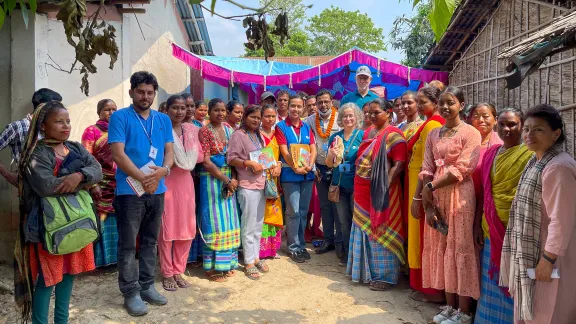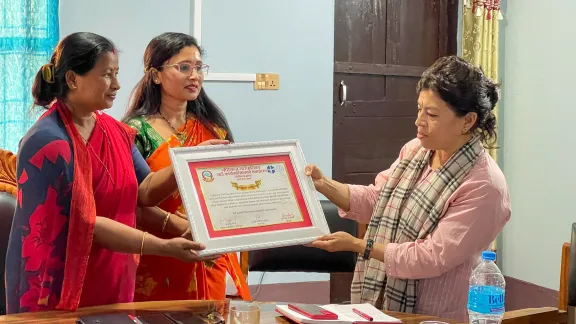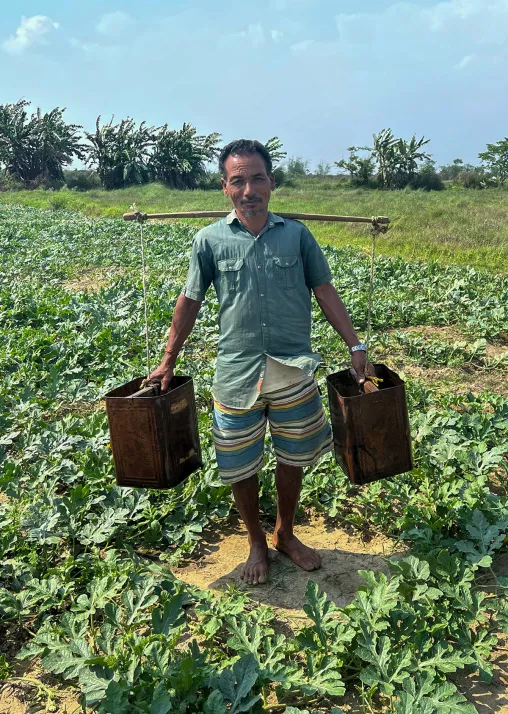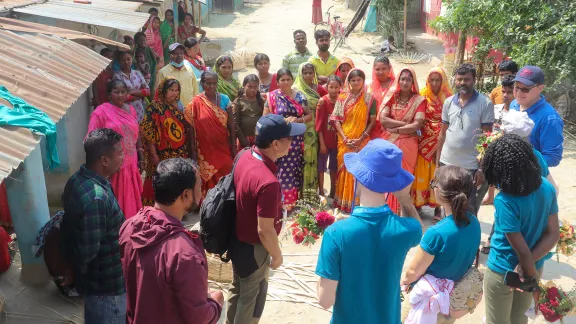In Asia, LWF works with marginalized communities in remote areas, prone to natural disaster and political instability. Building resilience in communities and as an organization was the theme of the Regional Management Team Meeting.

The LWF team and partners visit a community-owned cooperative focusing on business as well as social aspects of the community in Jhapa district. Photo: LWF/ Y. Gautam
LWF World Service Regional Management Team Meeting
(LWI) - Involving the communities at all project levels is vital to building resilience, says Susan Muis, Lutheran World Federation (LWF) Regional Program Coordinator for Asia. Representatives of the LWF programs in Myanmar-Laos, Bangladesh, and Nepal gathered in Kathmandu, Nepal, for the Regional Management Team Meeting. The main item on the agenda: how to build resilience organizationally and for the communities LWF serves.
A community-led response
LWF works with some of the most marginalized groups in the region, including Dalit communities in Nepal, displaced Rohingya in Myanmar and Bangladesh, and vulnerable local populations. In addition to political unrest, all LWF project countries are prone to natural disasters. LWF regularly assists after natural disasters such as floods and earthquakes by working closely with community disaster management committees.

LWF Nepal Country Representative Dr. Bijaya Bajracharya (right) receives an appreciation letter from the leaders of the local government. The letter was issued by the local government and appreciates the collaboration with LWF and its local partner organization SNJD in Jhapa district. Photo: LWF/ Y. Gautam
"Many communities we work with are in remote locations. Through early warning and disaster response, communities have used additional coping mechanisms, such as diversifying livelihoods in animal husbandry and kitchen farming, instead of solely relying on riskier riverbed farming. As a result, they have reduced the risks of depending on low-income sources, which has also increased their self-confidence and perseverance”, said Susan Muis, LWF Regional Program Coordinator for Asia.
“Now, we need to increasingly focus on climate-smart farming, as rains are longer, more intense, and less predictable, which requires farmers to diversify their livelihood. To address these challenges, we need to work in a community-based and community-led manner, with role models in communities and building strong partnerships and networks to maintain trust,” Muis continued.

A farmer in Morang district showing labor-intensive irrigation in riverbed farming. Photo: LWF/ S. Muis
Partnerships for hope and empowerment
The meeting took place from 20-24 March 2023. In addition to the LWF staff from the region, it also brought together local and international partners such as ACT Church of Sweden (ACT CoS), Australian Lutheran World Service (ALWS), Canadian Lutheran World Relief (CLWR), the Australian Department of Foreign Relations and Trade (DFAT), Diakonia of the Czech Brethren (Diakonia ECCB), the Evangelical Lutheran Church of America (ELCA), FinnChurch Aid (FCA), Cordaid, Finnish Evangelical Lutheran Mission (FELM), United Nations High Commissioner for Refugees (UNHCR), implementing partners in Nepal, and the Nepal Evangelical Lutheran Church.
Having strong partners is a significant asset when working in challenging operational contexts, said David Mueller, LWF Country Representative for Myanmar. “We are easily overwhelmed thinking about global peace and prosperity. But we can muster energy when we start with ourselves and find ways to bring hope and an empowered and sustainable future to our staff, organization, partner households, groups, communities, and institutions through our Country Programs”, he said.

Visit with a community in Morang district. Photo: LWF/ Y. Gautam
A focus on staff well-being
“Here at the Regional Management Team Meeting, we are reminded that we are part of a global communion of like-minded member churches and related agencies without whom we could not do our local work”, Mueller said.
Here at the Regional Management Team Meeting, we are reminded that we are part of a global federation of like-minded member churches and related agencies without whom we could not do our local work.
David MUELLER, LWF Country Representative Myanmar
“Working with partners makes us more resilient as organizations to support the most marginalized communities. This includes building the resilience of our hardworking staff in difficult locations and thinking about their well-being,” said Bijaya Bajracharya, LWF Country Representative in Nepal. “They help to empower communities and bring hope and dignity to those that still are marginalized. Making them more resilient will also benefit their communities.”


